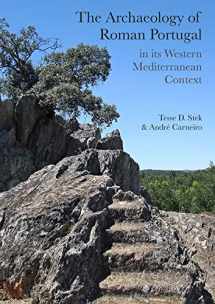
The Archaeology of Roman Portugal in its Western Mediterranean Context
Book details
Summary
Description
The Archaeology of Roman Portugal aims to contribute to the wider debate on Roman imperialism and expansionism, by bringing to the fore a much-underrepresented area of the Roman empire, at least in English-language scholarship: its westernmost edge in modern day Portugal. Highlighting the perspective from Roman Portugal will contribute to our understanding of the Roman empire, because it presents both an extraordinary landscape in the sense of economic opportunities (ocean resources, marble and metal mining) and settlement history. The volume aims to present new data and insights from both archaeology and ancient history, and to discuss their significance for our understanding of Roman expansion and imperialism. A key goal of the volume is to discuss how the Portuguese panorama compares to other areas of the Iberian peninsula.
An explicit goal of the volume is to better integrate Portuguese scholarship in the academic debate on the Mediterranean Roman world, and to contextualize it firmly in the wider Iberian and Western Mediterranean context. Therefore, chapters are produced by internationally diverse scholars in archaeology and ancient history from Portugal, Spain, Germany, the UK, the US, the Netherlands, Belgium, and Italy. With a view to asses the potential of integrating best practices in archaeological approaches and methodology, different national and disciplinary research traditions and historical frameworks will be explicitly discussed.
Table of Contents
Acknowledgements
List of contributors
Introduction
Tesse D. Stek and André Carneiro
I. Contested landscapes: between pre-Roman polities and early Roman encroachment
1. Exploring Rome’s early military deployment strategies in the north-east of the Iberian Peninsula
Jordi Principal and Carles Padrós Gómez
2. Late Iron Age and early Roman conflict and interaction in southern Callaecia (north-west Iberia)
João Fonte
3. Towers, territory, and the negotiation of a colonial landscape in the early Roman Central Alentejo
Joey Williams, Rui Mataloto, and Karilyn Sheldon
4. The last frontier: Late Iron Age society, Roman conquest, and the Romanisation of the territory north of the River Duero
Jesús García Sánchez
II. Economic targets: integrating and energising resources
5. Upgrading town appearances: relating white marble exploitation and town development in Roman Lusitania
Devi Taelman
6. Shifting landscapes: change and adaptation in the Lusitanian territory during the first globalisation
André Carneiro
7. Adding complexity to a complex world: the role of tableware imports in Portugal during the 2nd and 1st centuries BC
Vincenzo Soria
III. Cities and hillforts: settlement organisation in the Roman west
8. Land-use and settlement patterns around Ercavica in Antiquity: initial findings
Miguel Ángel Valero Tévar
9. Understanding the town-territory relationship: a case study from Lusitania
Cristina Corsi
10. Why would we need a city? The dispersed civitates in Lusitania
Pieter Houten
11. Roman rural life in the far west: the case study of the Serena Region (Badajoz, Spain)
Victorino Mayoral Herrera, Martina Cecilia Parini, and Luis Sevillano Perea
IV. Local religious and cultural identity
12. The role of cult places in shaping landscapes during the Roman expansion: an Iberian perspective on a Mediterranean process
Ignasi Grau Mira
13. Men, women, children, animals: the votive statuary from the sanctuary of Endovellicus at São Miguel da
Mota/Alandroal (Portugal)
Thomas G. Schattner
14. Romanising the mountains? Exploring cultural change through archaeological spatial analysis in western
Sierra Morena (Spain)
Maria del Carmen Moreno Escobar
15. Oppida and public spaces: constructing identities in Late Iron Age and early Roman north-west Iberia
Manuel Fernández-Götz and Marco V. García Quintela
16. Funerary practices and material culture: a ‘portrait from life’ in the fields of Lusitania
Mónica Rolo


We would LOVE it if you could help us and other readers by reviewing the book
Book review



